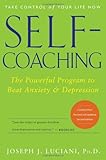Major Depression
Major depression is a mental health disorder which causes prolonged feelings of despair, worthlessness, irritability, and fatigue (see a more complete set of depression symptoms below). Major depression can strike at any age, although it is most common in young adulthood. Both men and women can experience major depression, however the disorder is more common in women.
Depression is sometimes called the "common cold" of mental health, because it is so common--nearly 10% of the population suffers from a depressive illness in any given year, according to NIMH. It is the leading cause of disability in the US and worldwide, according to the WHO. And though effective treatments exist for depression, many people continue to suffer in silence.
Symptoms of Major Depression
- Despair and hopelessness
- Little motivation to complete even simple tasks
- Thoughts or attempts of suicide
- Low self-esteem and self-confidence
- Low energy levels, tired and run-down
- Trouble falling asleep, nightmares, waking and can't fall back asleep
- Daily life is severely affected
- Loss of sex drive
- Loss of appetite
- Loss of interest in formerly pleasurable activities
- Symptoms last longer than two months
Differences by Gender
Depression in Women
Women are twice as likely as men to experience major depression. This discrepency may be due to the inherent hormonal fluctuations of womanhood, associated with the menstrual cycle, pregnancy, and menopause. Women are particularly vulnerable to depression following childbirth, a condition known as postpartum depression. Women suffering from major depression are more likely than men to attempt suicide.
Depression in Men
Men often conceal depression better and are less likely to seek treatment for major depression. Some men consider depression a women's illness, while others mask their symptoms with alcohol abuse or long work hours. While men are less likely to attempt suicide than women, men are more successful. The rate of suicide among men increases with age, peaking at 85. Depression in men tends to manifest itself in the form of irritability, anger, and feelings of discouragement and low self-worth.
Major Depression by Age Group
The onset of depression occurs most commonly between the mid-twenties and the mid-forties, although it can strike at any age. Depression in children is increasingly being recognized as a real illness.
Sponsored Links
Books on Major Depression
-
 Self-Coaching: The Powerful Program to Beat Anxiety and Depression
"For those who are uncomfortable with the thought of entering therapy or using medication, the self-coaching work here may be just the ticket to greater freedom from depression and anxiety."
Self-Coaching: The Powerful Program to Beat Anxiety and Depression
"For those who are uncomfortable with the thought of entering therapy or using medication, the self-coaching work here may be just the ticket to greater freedom from depression and anxiety."
-
 Feeling Good: The New Mood Therapy
"The break-through book on cognitive behavioral therapy that has helped millions tackle depression, anxiety, and self-doubt without the use of drugs."
Feeling Good: The New Mood Therapy
"The break-through book on cognitive behavioral therapy that has helped millions tackle depression, anxiety, and self-doubt without the use of drugs."
-
The Depression Cure: The 6-Step Program to Beat Depression without Drugs "It is a phenomenal book. It offers hope for people who struggle with depression as well as good advice for all of us to live better and more happily."
-
Hardcore Self Help: F**k Depression "[Dr. Robert Duff] explains very well what goes on in the head of a depressed person and gives frank advice and good ideas on how to get out of the hole of depression."
-
The Upward Spiral: Using Neuroscience to Reverse the Course of Depression, One Small Change at a Time "Provides a firm scientific foundation for how a person can begin the process of changing the depressed patterns of their brain. The book empowers the individual to take control of their mind."
Major Depression Links
- Take Our Depression Test
- NIMH: Depression
- NIMH: The Invisible Disease
- Clinical Depression - Wikipedia
Other Conditions Associated With Major Depression
The following conditions have been linked with major depression. The presence of one or many of these conditions may predispose individuals to this disorder.
- Alcoholism and drug abuse
- A history of child abuse
- Family history of depressive disorders
- Chronic stress and anxiety
- Certain medications may induce depression
- A life-changing event, good or bad
- Chronic illness, particularly terminal diseases
- Obsessive-compulsive disorder, anxiety and panic disorders
- Borderline personality disorder
- Eating disorder
